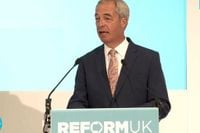On June 23, 2025, Reform UK leader Nigel Farage unveiled a bold and controversial plan aimed at reshaping the United Kingdom's tax landscape. Dubbed the "Britannia Card," the policy seeks to attract wealthy foreigners and British expatriates back to the UK by offering them a bespoke tax arrangement in exchange for a one-time payment of £250,000. Farage described the scheme as a way to encourage the return of wealth and talent to the country, promising a stable, indefinite remittance-style regime coupled with a 20-year inheritance tax shield.
Under this proposal, holders of the Britannia Card would be exempt from UK tax on their offshore income and capital gains for an agreed period, while still being liable for standard UK taxes on income, property, and spending sourced within the country. Farage emphasized that this is not a "golden visa" or a backdoor to citizenship but rather a one-off flat tax paid by newcomers in exchange for certainty over their tax status.
The policy aims to make the UK more attractive to high-net-worth individuals and entrepreneurs, with Farage stating, "We want as many entrepreneurs, as many risk takers, as many job creators, as many people paying lots of tax, as many people investing huge sums of money – we want as many of them as possible to be in our country." He lamented the recent trend of wealthy individuals leaving the UK, citing a figure of 10,800 wealthy people departing last year, though this number has been challenged by tax watchdog groups.
Reform UK's plan also includes a striking redistribution component. The £250,000 fees collected from each cardholder would be pooled and redistributed directly to the lowest-paid 10% of full-time workers in the UK. The party estimates that issuing 6,000 cards annually could generate £1.5 billion, enough to provide about 2.5 million low-paid workers with a tax-free bonus of £600 each year. If 10,000 cards are issued, the fund could rise to £2.5 billion, yielding bonuses of approximately £1,000 per worker.
Farage described this as a form of "Robin Hood tax," taking from the wealthy to support those on the lowest incomes. He predicted "tens of thousands" of people would be tempted by the offer, which could be renewed every ten years at no additional cost. Farage also argued that the initial payment would be "just the tip of the iceberg" compared to what these individuals would pay in stamp duty, VAT, and other taxes once residing in the UK.
However, the proposal has faced fierce criticism from political opponents and tax experts alike. Labour Chancellor Rachel Reeves denounced the plan as a "tax cut for foreign billionaires," warning that the government would either have to raise taxes on ordinary working people or cut public services such as the NHS to compensate for the lost revenue. A Labour spokesperson echoed these concerns, calling it a "golden ticket for foreign billionaires to avoid the tax they owe in this country," and warned that the resulting shortfall would have to be made up elsewhere, likely by working families.
Conservative shadow chancellor Mel Stride dismissed the policy as "fantasy economics" and "ruinously irresponsible," emphasizing the need for fiscal responsibility rather than such giveaways.
Tax Policy Associates, led by Dan Neidle, provided a detailed analysis of the plan’s financial impact. Using data from the Office for Budget Responsibility, Neidle estimated that the Britannia Card scheme would cost the UK government approximately £34 billion over five years. He highlighted three major concerns: firstly, the policy would discourage highly skilled professionals who cannot afford the £250,000 fee from moving to the UK, potentially making the country less competitive globally. Secondly, wealthy individuals might doubt the long-term stability of the scheme, limiting its uptake. Thirdly, the proposal would grant a substantial and costly tax windfall to a small number of very wealthy people already residing in the UK.
Neidle warned that the lost revenue would have to be recouped through either tax increases or spending cuts elsewhere, raising questions about the policy’s overall economic sustainability.
Reform UK’s former chairman, Zia Yusuf, defended the proposal, stating that it is already garnering interest among wealthy individuals who have left the UK or are deterred by high taxes. Yusuf pointed to reports suggesting that thousands of company directors have left the country since Labour took power, emphasizing the need to reverse this trend. He also noted that non-doms previously contributed an additional £8.9 billion annually through other taxes.
Yusuf explained, "This card will be available to foreign internationally wealthy people who are going to come here and create jobs and take risks. They will pay a landing fee of a quarter of a million pounds. The UK will become incredibly attractive to the internationally wealthy, but they must contribute immediately to the prosperity of the country and make a direct contribution into the pockets and the bank balances of the lowest 10 percent of earners in full-time work."
The timing of the Britannia Card proposal is notable. It follows the Labour government’s abolition of the longstanding "non-dom" tax status in April 2025, a regime that allowed individuals with permanent homes outside the UK to avoid paying tax on foreign income. Former Conservative Chancellor Jeremy Hunt also announced plans to remove this status. The government estimates that its package of measures related to non-doms will raise £12.7 billion over the next five years.
Under the old rules, non-doms paid an annual fee of £30,000 or £60,000 depending on their time spent in the UK, with HMRC figures showing 74,000 people claimed non-dom status in 2022-23. The Britannia Card would replace this with a one-off £250,000 payment, potentially making it more attractive to a select group of wealthy individuals.
The policy has stirred political debate ahead of the next national election, which must be held by mid-2029. Reform UK currently leads in many national polls, including a Sky/YouGov tracker that placed them at 34%, ahead of Labour at 25% and the Conservatives at 15%. This surge is attributed to growing dissatisfaction with mainstream politics and a shift towards Reform UK’s populist messaging.
Despite the party’s confidence, many remain skeptical about the practicality and fairness of the Britannia Card. Critics argue that while the policy promises to reward success and redistribute wealth, it risks undermining the tax system’s integrity and placing undue burdens on ordinary workers. The devil, as usual, lies in the details, which Reform UK has yet to fully disclose, including how thresholds for qualifying "high-net-worth newcomers" would be set or how HMRC would enforce the scheme.
As the debate unfolds, the Britannia Card stands as a provocative symbol of the tensions between attracting global wealth and ensuring equitable taxation at home. Whether it will become law or remain a political talking point is yet to be seen, but its unveiling has already reshaped conversations about wealth, fairness, and the future of Britain’s economy.



